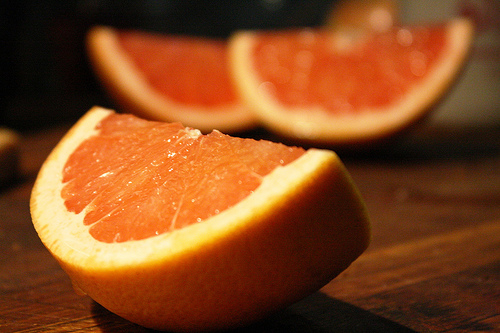Grapefruit May Act Like Atkins Diet, Attacking Fat In Liver
/
Researchers believe that naringenin, an antioxident derived from the bitter flavor of grapefruits and other citrus fruits may cause the liver to break down fat while increasing insulin sensitivity. If so, naringenin mimics a body process associated with long periods of fasting.
The results also mean that naringenin mimics the actions of several diabetes drugs, such as the lipid-lowering Fenofibrate and the anti-diabetic Rosiglitazone, offering the advantages of both.
If the results of this study extend to human patients, this dietary supplement could become a staple in the treatment of hyperlipidemia, type-2 diabetes, and perhaps metabolic syndrome. The report appears in this week issue of the online journal PLoS ONE. via Science Daily
Following a meal, the blood is flushed with sugars that activate LXRα, causing the liver to create fatty acids for long-term storage. During fasting, the process is reversed; fatty acids are released by fat cells, activate PPARα in the liver, and are broken down to ketones. A similar process, involving PPARγ, increases sensitivity to insulin.
Grapefruit Acts Like Atkins Diet
If you’ve been on the Atkins diet, you know about ketones and being in a state of ketosis. When we eat grapefruit, the liver behaves as if fasting, breaking down fatty acids instead of carbohydrates.
Ironically, grapefruit performs what dual PPARα and PPARγ drugs cannot. Big pharma has long sought a drug that mimics grapefruit. The citrus fruit is safe and may actually protect the liver from long-term damage.
Grapefruit’s bitter taste is caused the presence of the flavonoid naringin, which is broken down in the gut into naringenin. Earlier evidence has shown the compound has cholesterol lowering properties and may ameliorate some of the symptoms associated with diabetes.





























